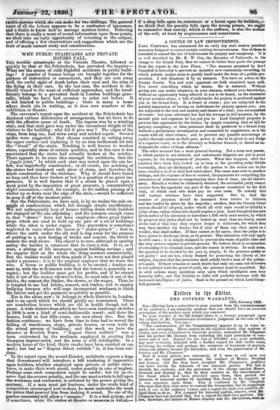A COUPLE OF LAW IMPROVEMENTS.
Loan CAKPBRLL has announced for an early day next session practical measures designed to correct certain existing inconveniences. One of these is intended to amend the law of indictments for perjury and conspiracy. It is so well described by Mr. E. W. Cox, the Recorder of Falmouth, in his charge to the Grand Jury, that we cannot do better than quote the passage from the report in the Law Times. "The measure promised by Lord Campbell is intended to prevent an injustice now continually occurring, by which private malice seeks to gratify itself under the form of a public pro- secution. I will illustrate it by an instance. You have an action in the County Courts. You and your opponent are both examined upon oath. You assert something which he denies. Ile is defeated. Without giving you any notice whatever, in your absence, without your knowledge, without an opportunity being allowed to you to be heard, on the statement of your accusers alone, a bill of indictment for perjury is preferred against you to the Grand Jury. It is found of course ; you are subjected to the painful imputation of having an indictment for perjury against you ; you are subjected to the cost and anxiety and shame of a trial; you are acquitted of course ; but your adversary has had his revenge in full measure, by the mental pain and expenses he has put you to. Lord Campbell proposes to prevent this oppression for the future, by simply requiring that no bill for perjury, conspiracy, or false pretences shall be preferred to a Grand Jury without a preliminary investigation and committal by magistrates, as is the course with all other crimes; and to prevent any possible miscarriage of justice through errors on their part, power is also to be given to any Judge of a superior court, or to the Attorney or Solicitor General, to direct an in- dictment for either of these offences."
The other measure has a more general bearing. Not a term now passes, in which justice is not delayed, and unfortunate litigants are put to great expense, by the disagreement of jurymen. When this happens, after the jurymen have been duly locked up as long as the presiding judge thinks reasonable, they are discharged ; and the parties to the action are in the same cOndition as if no trial had taken place. The cause goes over to another sittings, and the expense of fees to counsel, the payments for compelling the attendance of witnesses or compensating their loss of time, are all thrown away. Should a verdict be ultimately obtained, the successful party cannot recover from his opponent any part of the expense occasioned by the first trial, of which each side must pay its own costs. To remedy this
various schemes have been suggested. One is, that the number of jurymen should be increased from twelve to thirteen and the verdict be given by the majority ; another, that the County Court system should be' adopted, under which all civil suits would be tried by a judge alone, unless either aide should require a jury. Lord Campbell has now given notice of his intention to introduce a Bill early next session, by which he proposes that juries shall not be locked up more than six hours, unless at the end of that time they require longer to deliberate, for which they may have another six hours ; but if nine of them can then agree on a verdict, that shall suffice. If they cannot so far agree, then the judge is to have power to discharge them, as at present. This alteration will only apply to civil cases; it is simply designed to prevent the waste of public time and the very serious expense to private persons. We believe there is no intention of extending it to criminal cases, and the reason is obvious. In such cases, the question to be decided by the jury is, simply, Is the prisoner guilty or not guilty ? and our law, wisely. framed for protecting the liberty of the subject, requires that the prosecutor shall satisfy twelve men of the prison- er's guilt. If there remains so much doubt that only one man out of twelve is not satisfied with the proof of guilt, the prisoner must be acquitted. But in civil actions many questions arise upon which intelligent men may honestly differ, and this liability to differ will probably increase with the increased intelligence of juries. Such is the ground on which Lord Camp- bell proceeds.






























 Previous page
Previous page